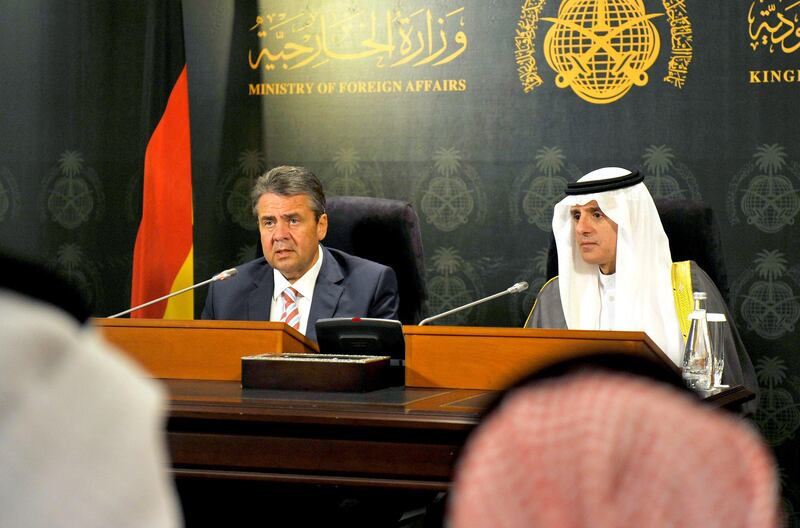The German foreign minister said Qatar has agreed to allow Berlin’s intelligence service to monitor its finances to address accusations by the quartet of Arab countries about Doha’s ties to extremist groups.
Sigmar Gabriel earlier this week visited Doha, Riyadh, Abu Dhabi and Kuwait, which is leading mediation between the two sides, as part of international efforts to resolve the crisis. Analysts said the involvement of third parties to audit Qatar could provide a template for addressing the core concerns of Saudi Arabia, the UAE, Bahrain and Egypt.
“Measures agreed with the US on combatting counter-terrorism financing and also with Germany as an auditor are strong components of a positive broader settlement that allows both sides a measure of face saving,” said Andrew Bowen, a Gulf scholar with the American Enterprise Institute who has met recently with officials from both sides of the dispute.
Gulf sources in Washington have also said there have been talks with US Treasury and other officials about enhanced monitoring measures that Qatar can implement.
Speaking to Deutschlandfunk radio on Thursday, Mr Gabriel said Qatar had agreed to “open all its books” to German intelligence officials “if we have questions about certain people or structures”.
He added that the risk of military escalation between Qatar and its GCC neighbours as well as Egypt is now off the table. The German diplomat said that despite the strong reactions from the quartet's foreign ministers after they met to discuss Qatar’s direct response to the list of 13 demands, they produced a shorter list of principles outlining their position.
Despite the optimism from those in the Europe and the US, officials from the countries that accuse Doha of financing and promoting extremism say that Qatar’s rejection of their demands means additional measures are now being discussed.
The anti-Qatar bloc plans to meet in Bahrain to finalise what steps they will take, but a date for the meeting has not been set.
Dr Anwar Gargash, Minister of State for Foreign Affairs, tweeted on Thursday: "For any real discussion with Doha to gain traction, it has to be responsible for past actions and recognise the necessity of changing course."
The UAE Foreign Minister, Sheikh Abdullah bin Zayed, said after the meeting in Cairo on Wednesday that any new measures would adhere to international law.
Observers, including diplomats and analysts based in the Gulf, said there is more latitude for economic – rather than political – pressure to be ratcheted up, with steps that dent Qatar’s reputation and increase risks for international companies and banks doing business with Doha. This includes jeopardising or making more expensive access to the other larger GCC economies.
The crisis has already taken a toll, with Moody’s on Wednesday cutting Qatar’s outlook to negative due to the likelihood of the crisis continuing and further increasing economic risks.
But no decisions on how to increase economic and political pressure on Doha were made on Wednesday after the quartet met in Cairo.
Ahead of the meeting to discuss Qatar’s response, US president Donald Trump spoke with his Egyptian counterpart Abdel Fattah El Sisi and “called on all parties to negotiate constructively to resolve the dispute”, the White House said. Mr Trump has backed the steps taken against Qatar, but over the past week has appeared to move more closely in line with his secretary of state, who has staked out a more neutral position.
With the US president signaling his desire to see a resolution, and his broader goal of boosting the American economy, there is also a limit to how deep further economic sanctions on Qatar can go. The prospect of foreign companies being forced to choose between Qatar and its neighbours seems remote, and would not be without its own risks for the quartet.
The Saudi and UAE markets are larger than Qatar’s, and some foreign companies may already be taking informal steps to make sure they do not anger the two bigger countries. But putting in place new measures that harm Qatar's economy will have to be calibrated carefully.
Meanwhile the war of words between the two sides continued on Wednesday with Saudi Arabia accusing Doha of being behind more than 23,000 Twitter accounts it accuses of stoking dissent inside the kingdom.
"Some of them linked to accounts calling for revolution in Saudi Arabia," information minister Awwad Saleh Al Awwad said in Paris.
With additional reporting by Associated Press and Agence France-Presse





